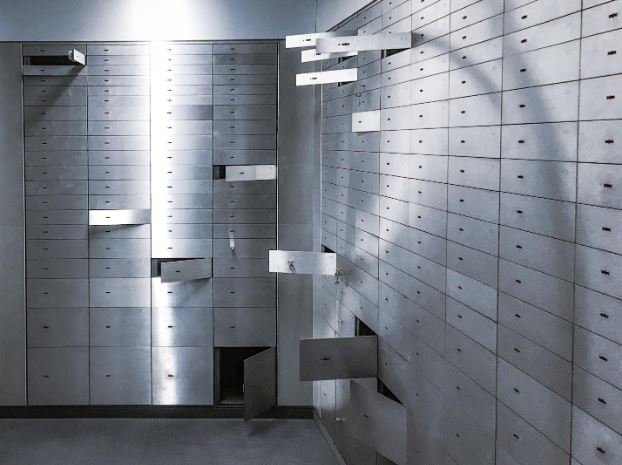
If you need to store your money safely or keep it out of the way, there are numerous options. Some storage solutions work better than others, however.
Safe deposit boxes are often the ideal storage for precious metals like gold and silver bars and coins, but they may not be ideal for important documents or items that require immediate attention.
Depositories
Depository banks are institutions that store your money and make it accessible when needed. Plus, they’re great ways to earn interest on savings – available from commercial banks, credit unions, thrift institutions and other financial institutions.
Common services offered by depository banks include checking and savings accounts, mortgages, car loans, credit cards and business services; plus they typically feature high vault security which protects funds against theft or damage.
Depositories allow you to invest your money in a time and demand deposit account with guaranteed returns on investment (ROI). This can be done using certificates of deposit, online savings accounts, mobile apps or combinations thereof. Plus, these accounts are insured by the Federal Deposit Insurance Corporation (FDIC), so your funds remain safe in case of an emergency. They insure up to two hundred and fifty thousand dollars per investor per depository, so for many all of their money is safe and secure.
Another great thing about depositories is they make it easy for you to get out of the bank when needed via ATM, check or wire transfer. This means that you can access your money anywhere you are in the country quickly. Some institutions even offer free withdrawals from out-of-network ATMs. Others offer low-cost access for those travelling outside the territory of their lending institution.
There are many recognized, reputable companies that offer security for your financial assets. A company like Brinks Depository has the highest level of public trust, and as such can be a great company to partner with in order to store your valuables. Always consider the reputation of an institution before you store your valuables.
Safely Storing Valuables at Home
If you own expensive jewelry, money or important documents, it’s wise to store them safely at home. Doing this will keep your belongings out of the reach of burglars, fire and natural disasters.
Consider hiding your belongings in a closet, under the bed or another area that burglars are unlikely to search. This is especially beneficial if you have kids or pets at home; it would be wise to secure these areas behind a door or in a closet with a lock and other security feature which will make it difficult for intruders to enter your home.
Drawers are usually a secure place to hide valuables, but you can make them harder for burglars by creating a false bottom drawer. This tactic creates an inch or two of space between the bottom of your drawer and this “fake” bottom, making it more difficult for thieves to detect if anything is hidden there.
Hiding valuable items in a mason jar is another secure and cost-effective solution. To do this, place the desired items inside a toilet paper roll before placing it inside a mason jar filled with candy or potpourri.
A fake bottom drawer, hollow book or freezer bag can all be used to conceal small objects and valuables. If you don’t feel confident destroying a book, try hollowing out an old table or chair leg instead. You can click here for more ideas on where to store your valuables around the home.
When considering where your most precious possessions should go, consider whether they can be replaced and then decide whether you should store them in a bank safety deposit box or an at-home safe. This is the best way to safeguard your items while at home and also provides easy access should you ever need them.
Safe deposit boxes
If you have valuables that you don’t want to lose or misplace, a safe deposit box may be ideal for you. These safes are typically located in banks or credit union vaults and feature two locks: the customer inserts their personal key into one lock while the financial institution’s key goes into the other – this system ensures no one can access your contents without both keys being present.
It’s essential to remember that access to your box can only be granted during normal banking hours. That could mean waiting in line at the bank for an employee to let you in; and if your location experiences a pandemic or other natural disaster, banks may close down branches temporarily. You can learn more by clicking the link.
You can open a safe deposit box with more than one person, often referred to as a “co-lessor.” A co-lessor will have equal rights and usually their own key for accessing the contents of your box; they also need to maintain its condition.
Your heirs should know about your safe deposit box and how to access it in the event of your death, so make sure they have a written list of what’s inside. This could include copies of your original wills and powers of attorney as well as an extensive inventory of items you stowed away.
If you own a safe deposit box, it is wise to utilize it regularly and keep track of what’s inside. That way, in case something unfortunate occurs to the box, you will know exactly what’s there and can file insurance claims or replace documents that were lost.
Certificates of deposit
If you’re searching for a low-risk way to store your money, certificates of deposit could be the ideal option. They’re federally insured, so there’s no need to worry about losing funds if something goes awry with the bank or credit union. But before opening one of these accounts, it’s essential that you understand what they entail and how best to manage them.
CDs are special savings accounts that offer higher interest rates than regular savings accounts. These are ideal for people with extra cash who need to keep it safe until they need it.
Banks and credit unions typically offer CDs, as do brokerage firms. Certificates of deposit are insured up to $250k by the Federal Deposit Insurance Corporation (FDIC), so you’re protected in case the bank or credit union goes out of business. You can click the link: https://www.fdic.gov/ for more information.
CDs come in many varieties, from liquid to step-up and no-penalty options. Furthermore, you have your choice between fixed rate and adjustable rate CDs to suit your individual needs.
If you have excess cash that won’t be needed for several years, a CD may be an attractive option to earn higher interest than savings accounts while still giving yourself some flexibility.
These products can be beneficial if you want to invest in the stock market without risking your principal. However, they’re not suitable for everyone; therefore it’s essential that you assess your personal financial situation and objectives before purchasing a CD.
Some people use CDs to save for a major purchase or create an emergency fund. Others use them to set aside money for special trips or vacations.
Success with a CD depends on selecting the term length that works best for your situation. The longer your CD remains open, the higher interest rate you’ll earn.
Once you know the term you need, you can search for a CD at either your local bank or credit union or online financial institutions offering them. Most banks and credit unions provide both traditional and flexible CD options so that you can find something that meets both your budget and personal financial objectives.
There are several different ways to keep your money safe, each with their own benefits and drawbacks. It is important for you to research these methods in order to decide which one is best for you.







